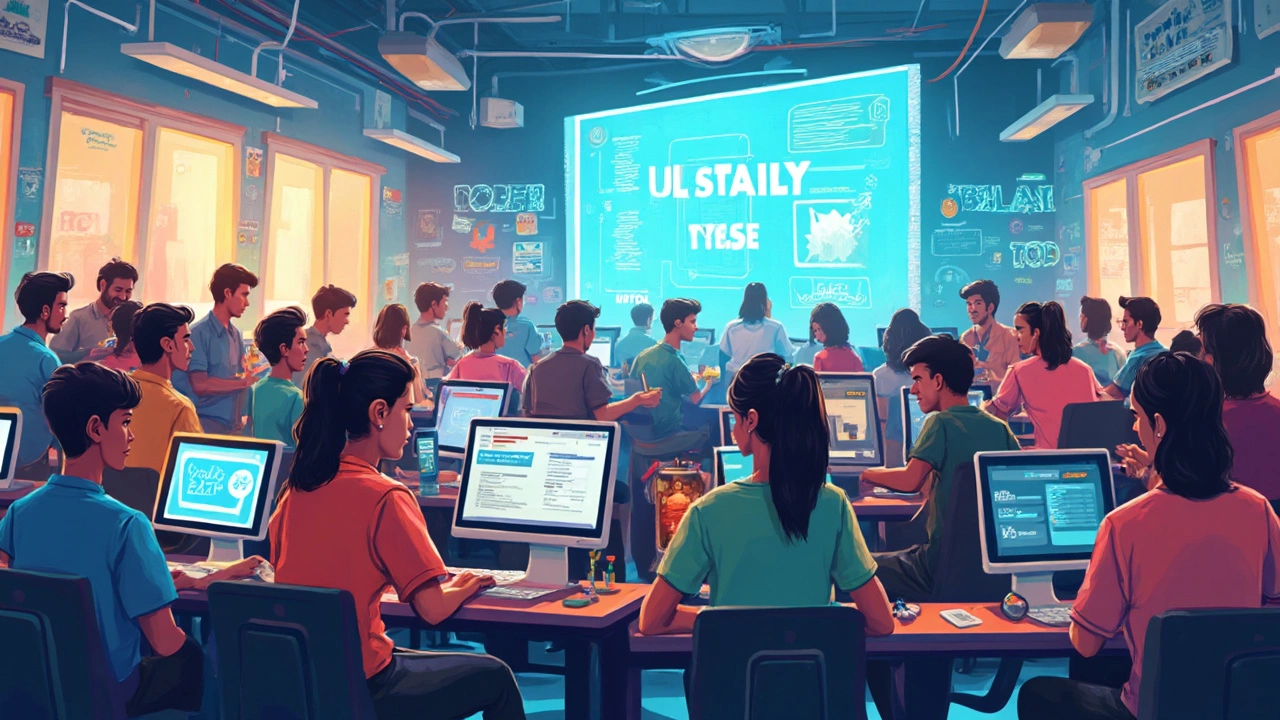Picking the right language to start coding can feel like choosing the perfect pizza topping—overwhelming but essential. With endless options on the menu, it's easy to get lost. But fear not, if you're a newbie in 2025, some languages are super beginner-friendly and make the process smoother.
Let's face it, learning to code is a big move and opens up some serious career doors. Whether you're looking to become the next tech giant or just want to automate your daily tasks, the programming world is where the magic happens. But the question remains: where do you begin?
Languages like Python and JavaScript are hot favorites among beginners, and for good reason. They're versatile, widely used, and boast massive communities ready to help you out. Plus, they're like an easy warm-up before you dive into more complex stuff.
- Why Learning to Code is Important
- Top Beginner-Friendly Languages
- Most Common Challenges Beginners Face
- Resources for Learning to Code
- Finding Your Ideal Learning Path
Why Learning to Code is Important
Imagine you're gearing up for a future where technology keeps pushing the limits. Learning to code is like getting a superpower to ride this tech wave. Whether you're aiming to kickstart a tech career or just want a nifty skill, coding is the backbone of everything digital.
The job market is bursting with opportunities for those who know how to code. Companies from all sectors, not just tech, crave skilled programmers who can help them innovate and solve problems. It's no wonder that coding skills are tagged as some of the most in-demand in 2025, offering job security and competitive salaries.
But beyond career perks, coding sharpens your problem-solving skills. It's like brain training—tackling challenges, thinking analytically, and coming up with solutions gets easier. Plus, it's a universal language. You break down language barriers when you speak code, opening doors globally for collaboration and opportunities.
Not to mention, with coding for beginners, you'll get into the maker's mindset. You'll create, build, and customize digital spaces that could lead to your startup or innovation. Coding fuses creativity and logic, and that's a combo you can't beat.
If you're still on the fence, think of coding as a skill that keeps the doors open. Whether you're an artist wanting to create interactive art or a business guru aiming for automated solutions, coding has a place. No wonder learning programming is not just a trend—it's becoming essential.
Here's a quick look at coding's role in job market growth:
| Year | Job Growth in Tech Sector | Demand for Coding Skills |
|---|---|---|
| 2020 | 15% | High |
| 2025 | 25% | Very High |
Diving into beginner coding languages now sets you on a path for the future. It's a world packed with opportunities, and coding is your ticket in.
Top Beginner-Friendly Languages
Diving into coding can be intimidating, but choosing the right language makes all the difference. Let's talk about the most approachable options out there today for beginners.
Python is often the first stop for many newcomers. It's got a clean and readable syntax, which means you spend less time banging your head against the wall trying to figure out complex code. Plus, with Python being used for everything from web development to data science, it’s a language where you'll find loads of opportunities and resources.
Then there's JavaScript, the go-to language for web development. If you're interested in bringing websites to life, this one's unbeatable. It's also a stepping stone into frameworks like React and Node.js, which are huge in the tech world. JavaScript runs on any web browser, so no complicated setup needed—you're off and running in no time.
Another great pick is Scratch, especially if you’re younger or teaching kids. It’s a visual programming language that uses drag-and-drop blocks to create code. This helps beginners understand programming concepts without needing to memorize any syntax.
Meanwhile, Ruby is known for its user-friendly and elegant code. It powers Ruby on Rails, a popular web development framework. Beginners appreciate how logical Ruby is, which makes writing code feel more intuitive.
Last but not least, Java is a solid choice for those aiming to build Android apps or dive into enterprise solutions. While it's a bit more complex than some others on this list, its strict rules teach you good programming habits—and that’s a plus in the long run.
So, whether you're aiming to become a web guru or just want to automate your life, starting with one of these beginner languages sets you on a promising path. They're popular for a reason—because they open doors, offer support, and make the learning curve a little less steep.

Most Common Challenges Beginners Face
Diving into the world of coding can be a bit like trying to learn to ride a bike on a muddy track—it's exciting, but there are definitely a few bumps along the way. If you're just starting with coding for beginners, you're not alone in facing some common roadblocks.
One of the biggest hurdles is the overwhelming amount of information. There's just so much to learn that it can feel like you're drowning in a sea of data and options. This information overload can be intimidating and sometimes makes new learners want to give up before they've even really started.
Syntax errors are another classic frustration. You'd be amazed at how a small missed comma or an unexpected semicolon can turn your screen into a sea of red error messages. And it doesn't help that at first, those messages might seem like they're written in a foreign language.
Then there's the challenge of understanding abstract concepts. Yeah, coding isn't just about typing out lines; it's about getting your head around how computers think. Ideas like loops, conditionals, and variables can be a sticky wicket when you're new to programming.
Debugging code can also be a hair-puller. Picture this: you've written what you think is perfect code, but somehow it doesn't work. Finding the needle in this haystack can be downright frustrating.
Here's a quick look at some other challenges in a handy table format:
| Challenge | Description |
|---|---|
| Time Management | It's easy to spend hours on a problem without realizing the time that's gone by. |
| Lack of Motivation | Initial enthusiasm can wane if progress feels slow. |
| Resource Overload | Choosing the right resource from countless tutorials and books is tough. |
But hey, every coder's been there, and it's all part of the process. Remember, each of these challenges is a stepping stone on your way to mastering programming, so hang in there!
Resources for Learning to Code
Jumping into the coding world can be daunting, but with the right resources, you can make the process a whole lot smoother. Luckily, the internet is filled with platforms and tools to help you ace those first steps into programming.
When it comes to online courses, learning programming becomes easier thanks to platforms like Codecademy and Coursera. Codecademy offers interactive lessons that are super engaging, helping beginners understand concepts by actually writing code. Coursera, on the other hand, provides university-backed courses, which means you'll be learning from the pros!
If you're more of a visual learner, YouTube is packed with free resources. Channels like "The Net Ninja" or "Traversy Media" offer tutorials on pretty much any coding topic you can think of, from beginner coding languages to advanced projects.
And let’s not forget books — yes, they still exist! Books like "Automate the Boring Stuff with Python" make coding approachable and fun, taking you through real-world projects like web scraping or automating spreadsheets.
Coding communities can also be a huge help. Websites like Stack Overflow are populated with coders who have been right where you are. They’re always ready to answer your questions and help you solve problems that might have you stumped.
For those who love to learn by doing, hackathons and coding challenges on platforms like HackerRank are a great fit. They provide real-life scenarios to test your skills and help you solidify what you’ve learned in a fun and competitive environment.

Finding Your Ideal Learning Path
Navigating the vast world of coding can be like finding your way out of a dense forest. The trick? Pick a path that suits where you want to end up and how you want to get there. Here's the lowdown on figuring out your personal roadmap.
First up, think about your goals. Are you diving into coding to start a new career, or just to mess around with cool projects in your spare time? Your end goal can really shape which route you take.
"The best way to predict the future is to create it." – Alan Kay, a computer science pioneer.
With that in mind, here's a quick breakdown:
- Self-paced online courses: Websites like Coursera and Udemy offer amazing flexibility. You control the pace, learn from industry experts, and can revisit tricky sections anytime.
- Bootcamps: Don't have years to invest? Intensive coding bootcamps can teach you the ropes in just a few months. They're often focused on getting you job-ready quickly.
- Traditional education: Colleges and universities offer structured programs that dive deep into theory. It's a solid option if you aim for something like software engineering.
- Interactive Platforms: Platforms like Codecademy and freeCodeCamp get you coding right away. The hands-on approach is perfect if you learn by doing.
Curious about how effective these options are? Check this out:
| Method | Average Completion Time | Job Placement Rate |
|---|---|---|
| Bootcamps | 3-6 months | 70% |
| Self-paced Online | 1-2 years | Varies |
| Traditional Education | 4 years | 85% |
Look at your schedule, your budget, and the way you learn best. Bootcamps are intense and can be costly, but they jumpstart careers fast. Self-paced online courses fit into busy routines without breaking the bank.
So there you have it. The important part? Start somewhere and keep going. The coding world is vast, but with the right path, you’ll be navigating it like a pro before you know it!
